Employees Talk Cultural Representation for AANHPI Heritage Month
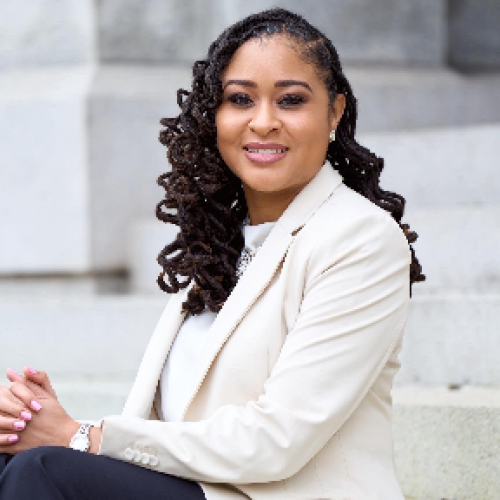
Jessica McRae
Blackbaud Employee








Employees from the AANHPI Community share their unique stories and perspectives about the importance of belonging and cultural representation in the workplace. Open to see what they had to say.Hi Blackbaud Community!
This month, we’re honored to celebrate, Asian American, Native Hawaiian & Pacific Islander (AANHPI) Heritage Month in the US and Asian Heritage Month in Canada. These important observances commemorate the ancestry and legacies of those who have worked relentlessly to help shape US and Canadian history. The AANHPI community is extraordinarily diverse and comprised of a vast group of vibrant cultures, languages, and religions from Hawaii to Pacific Island territories to several countries across Asia—many of which are represented here at Blackbaud!
To celebrate AANHPI Month, several of our employees from a wide array of diaspora communities, including Vietnam, China, Malaysia, and Taiwan, shared their unique experiences about belonging and cultural representation in the workplace. Keep reading to see what they shared.
Karen Chung
Corporate Impact HR Business Partner
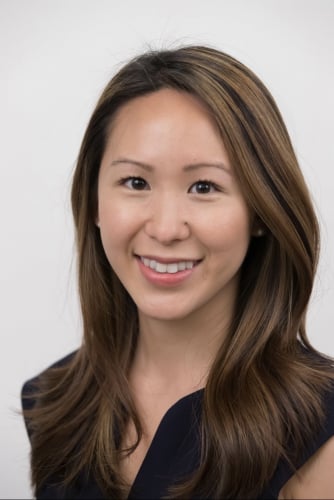
To me, cultural representation in the workplace means belonging and this means being yourself without hiding or altering parts of yourself. Growing up, I struggled with this. As a child of Taiwanese immigrants, I was torn between two worlds: one where I was just another American kid, and another where Taiwanese culture and traditions were followed. I was never sure how much I belonged in either world, and it felt like to fully belong in one culture, I’d have to reject parts of the other.
It's been a journey to fully embrace my Asian heritage and recognize that I can be both Asian and American, not just one or the other. I’ve been able to connect deeply with the Asian community through volunteering with Apex for Youth, an NYC-based organization empowering Asian and immigrant youth, and by having conversations with others about identity, the immigrant experience, and race. These small steps helped me understand the concept of belonging and how beautiful it can be when one feels accepted for all that they choose to be.
Muzel Chen
Web Marketing Product Manager
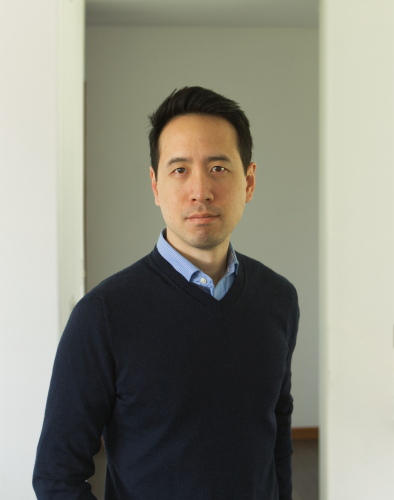
Growing up in the 1980s, Asians represented in the media were not very diverse. According to what my friends and I saw on TV, Asian kids were fragile brainiacs while other kids were athletic leaders. My friends assumed I’d match this stereotype. But the moment I flipped the script in P.E. and became the athletic one in a game of dodgeball, I no longer fit their worldview. Or friendship. I was always picked last in P.E. from then on. Better representation in the media would help show others that Asians don’t always fit neatly into a model minority box.
It may be easy to dismiss corporate diversity initiatives as insincere but, for me, it’s a reminder that we’re slowly changing the narrative. With the explosion of social media, there are more ways to access information or to find a role model. And I’ve appreciated seeing the diversity work displayed at Blackbaud—with Asians in leadership positions and ongoing support to ESG programs worldwide. These types of efforts give me hope for the world my 4-year-old biracial son will inherit.
Arthur Huynh
Principal Software Engineer
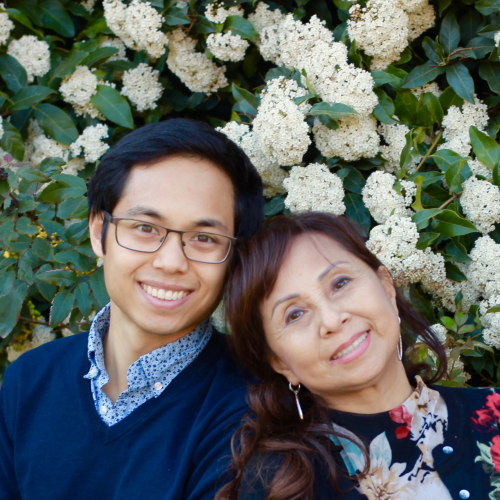
Being the child of immigrant parents who fled their war-torn country to start life anew in the United States, I carry with me the legacy of their resilience. Their hardships and life experiences have played a formative role in shaping my cultural identity. I affectionately recall now my mother being quick to whip out a harrowing story of her escape when I was complaining about something trivial as a child. She definitely had a way of keeping me grounded!
I inherited my mother’s unwavering sense of duty and deep commitment to familial obligations, which have greatly influenced how I approach my work. I place a lot of weight on the accomplishments of the team as a whole and measure part of my success in how I contribute to that. It’s hardwired in me not to be too opinionated to maintain harmony, but I often have to remind myself that in an inclusive work culture, our differences are empowering! It's more important than ever for companies to highlight and promote the unique qualities of our employees.
Brian Chan
Data Platform Product Manager
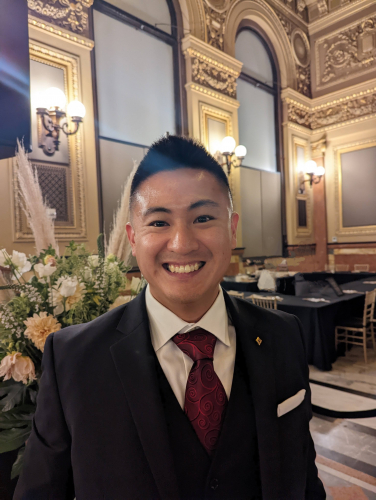
I am known as someone who is third-cultured. My parents are ethnically Shanghainese, but I was born in the United States and lived in Hong Kong until I was 7, so it wasn’t easy to find a place where I felt I truly belonged. It was not until a few years ago that I took a hard look at what being Asian American meant to me, and it will be a life-long journey of self-discovery, affirmation, and gratitude. We are not a monolith. With experience in growing employee resource groups (ERGs) at previous companies, as well as being involved in an AAPI non-profit organization, I am hopeful that we can celebrate Asian cultures from all diasporas, educate our allies, and continue to grow a professional and social network that is engaging and impactful here at Blackbaud.
Rachel Ngu
Director, Enterprise Account Management, Corporate Impact
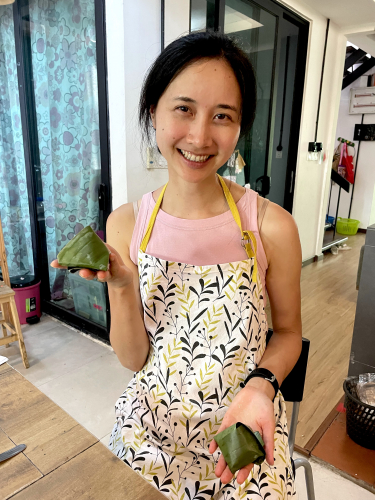
I was born in Sarawak, Borneo, Malaysia and when I was eight years old, my family moved to America. The experience of arriving as a newcomer to a well-established community leaves an indelible mark, even when you’ve moved on from those early years, and represented your school in national track championships, graduated from an Ivy League, and have become a mentor to other students.
When I saw that EverFi had an Asian American group, I signed up immediately because it felt like a way that I could bring my full self to the workplace. It was a sort of nod to my 8-year-old self on a subconscious level—"Hey, you, the new gal with the thick Malaysian accent. I see you and there’s space for you here!”
I’ve realized personally, not just intellectually, how important representation is. If you don’t see someone that you identify with, it’s similar to being rendered invisible. Thank you to all my colleagues and bosses who have encouraged me along the way—you know who you are!
We hope you enjoyed reading these inspiring stories from our employees!
Happy AANHPI Month!
This month, we’re honored to celebrate, Asian American, Native Hawaiian & Pacific Islander (AANHPI) Heritage Month in the US and Asian Heritage Month in Canada. These important observances commemorate the ancestry and legacies of those who have worked relentlessly to help shape US and Canadian history. The AANHPI community is extraordinarily diverse and comprised of a vast group of vibrant cultures, languages, and religions from Hawaii to Pacific Island territories to several countries across Asia—many of which are represented here at Blackbaud!
To celebrate AANHPI Month, several of our employees from a wide array of diaspora communities, including Vietnam, China, Malaysia, and Taiwan, shared their unique experiences about belonging and cultural representation in the workplace. Keep reading to see what they shared.
Karen Chung
Corporate Impact HR Business Partner

To me, cultural representation in the workplace means belonging and this means being yourself without hiding or altering parts of yourself. Growing up, I struggled with this. As a child of Taiwanese immigrants, I was torn between two worlds: one where I was just another American kid, and another where Taiwanese culture and traditions were followed. I was never sure how much I belonged in either world, and it felt like to fully belong in one culture, I’d have to reject parts of the other.
It's been a journey to fully embrace my Asian heritage and recognize that I can be both Asian and American, not just one or the other. I’ve been able to connect deeply with the Asian community through volunteering with Apex for Youth, an NYC-based organization empowering Asian and immigrant youth, and by having conversations with others about identity, the immigrant experience, and race. These small steps helped me understand the concept of belonging and how beautiful it can be when one feels accepted for all that they choose to be.
Muzel Chen
Web Marketing Product Manager

Growing up in the 1980s, Asians represented in the media were not very diverse. According to what my friends and I saw on TV, Asian kids were fragile brainiacs while other kids were athletic leaders. My friends assumed I’d match this stereotype. But the moment I flipped the script in P.E. and became the athletic one in a game of dodgeball, I no longer fit their worldview. Or friendship. I was always picked last in P.E. from then on. Better representation in the media would help show others that Asians don’t always fit neatly into a model minority box.
It may be easy to dismiss corporate diversity initiatives as insincere but, for me, it’s a reminder that we’re slowly changing the narrative. With the explosion of social media, there are more ways to access information or to find a role model. And I’ve appreciated seeing the diversity work displayed at Blackbaud—with Asians in leadership positions and ongoing support to ESG programs worldwide. These types of efforts give me hope for the world my 4-year-old biracial son will inherit.
Arthur Huynh
Principal Software Engineer

Being the child of immigrant parents who fled their war-torn country to start life anew in the United States, I carry with me the legacy of their resilience. Their hardships and life experiences have played a formative role in shaping my cultural identity. I affectionately recall now my mother being quick to whip out a harrowing story of her escape when I was complaining about something trivial as a child. She definitely had a way of keeping me grounded!
I inherited my mother’s unwavering sense of duty and deep commitment to familial obligations, which have greatly influenced how I approach my work. I place a lot of weight on the accomplishments of the team as a whole and measure part of my success in how I contribute to that. It’s hardwired in me not to be too opinionated to maintain harmony, but I often have to remind myself that in an inclusive work culture, our differences are empowering! It's more important than ever for companies to highlight and promote the unique qualities of our employees.
Brian Chan
Data Platform Product Manager

I am known as someone who is third-cultured. My parents are ethnically Shanghainese, but I was born in the United States and lived in Hong Kong until I was 7, so it wasn’t easy to find a place where I felt I truly belonged. It was not until a few years ago that I took a hard look at what being Asian American meant to me, and it will be a life-long journey of self-discovery, affirmation, and gratitude. We are not a monolith. With experience in growing employee resource groups (ERGs) at previous companies, as well as being involved in an AAPI non-profit organization, I am hopeful that we can celebrate Asian cultures from all diasporas, educate our allies, and continue to grow a professional and social network that is engaging and impactful here at Blackbaud.
Rachel Ngu
Director, Enterprise Account Management, Corporate Impact

I was born in Sarawak, Borneo, Malaysia and when I was eight years old, my family moved to America. The experience of arriving as a newcomer to a well-established community leaves an indelible mark, even when you’ve moved on from those early years, and represented your school in national track championships, graduated from an Ivy League, and have become a mentor to other students.
When I saw that EverFi had an Asian American group, I signed up immediately because it felt like a way that I could bring my full self to the workplace. It was a sort of nod to my 8-year-old self on a subconscious level—"Hey, you, the new gal with the thick Malaysian accent. I see you and there’s space for you here!”
I’ve realized personally, not just intellectually, how important representation is. If you don’t see someone that you identify with, it’s similar to being rendered invisible. Thank you to all my colleagues and bosses who have encouraged me along the way—you know who you are!
We hope you enjoyed reading these inspiring stories from our employees!
Happy AANHPI Month!
2
Categories
- All Categories
- 6 Blackbaud Community Help
- 209 bbcon®
- 1.4K Blackbaud Altru®
- 395 Blackbaud Award Management™ and Blackbaud Stewardship Management™
- 1.1K Blackbaud CRM™ and Blackbaud Internet Solutions™
- 15 donorCentrics®
- 359 Blackbaud eTapestry®
- 2.5K Blackbaud Financial Edge NXT®
- 646 Blackbaud Grantmaking™
- 563 Blackbaud Education Management Solutions for Higher Education
- 3.2K Blackbaud Education Management Solutions for K-12 Schools
- 934 Blackbaud Luminate Online® and Blackbaud TeamRaiser®
- 84 JustGiving® from Blackbaud®
- 6.4K Blackbaud Raiser's Edge NXT®
- 3.7K SKY Developer
- 243 ResearchPoint™
- 118 Blackbaud Tuition Management™
- 165 Organizational Best Practices
- 238 The Tap (Just for Fun)
- 33 Blackbaud Community Challenges
- 28 PowerUp Challenges
- 3 (Open) Raiser's Edge NXT PowerUp Challenge: Product Update Briefing
- 3 (Closed) Raiser's Edge NXT PowerUp Challenge: Standard Reports+
- 3 (Closed) Raiser's Edge NXT PowerUp Challenge: Email Marketing
- 3 (Closed) Raiser's Edge NXT PowerUp Challenge: Gift Management
- 4 (Closed) Raiser's Edge NXT PowerUp Challenge: Event Management
- 3 (Closed) Raiser's Edge NXT PowerUp Challenge: Home Page
- 4 (Closed) Raiser's Edge NXT PowerUp Challenge: Standard Reports
- 4 (Closed) Raiser's Edge NXT PowerUp Challenge: Query
- 779 Community News
- 2.9K Jobs Board
- 53 Blackbaud SKY® Reporting Announcements
- 47 Blackbaud CRM Higher Ed Product Advisory Group (HE PAG)
- 19 Blackbaud CRM Product Advisory Group (BBCRM PAG)